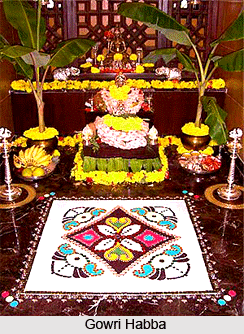 Gowri Habba is a significant festival in parts of Karnataka, Andhra Pradesh and Tamil Nadu. It is celebrated in Maharashtra and is known as Hartalika. It is known as bhaadrapada shukla paksha in Goa. Goddess Gowri (Gauri) is the mother of Lord Ganesha and wife of Lord Shiva. As per hindu beliefs Goddess Gowri is the incarnation of Aadhi Shakthi Mahamaya. She is Shakti of Lord Shiva. It is believed that on the third day of the month of Bhaadra, Goddess Gowri comes home like any married girl comes to her parents` house. The next day Lord Ganesha, her son, comes as if to take her back to Kailasa.
Gowri Habba is a significant festival in parts of Karnataka, Andhra Pradesh and Tamil Nadu. It is celebrated in Maharashtra and is known as Hartalika. It is known as bhaadrapada shukla paksha in Goa. Goddess Gowri (Gauri) is the mother of Lord Ganesha and wife of Lord Shiva. As per hindu beliefs Goddess Gowri is the incarnation of Aadhi Shakthi Mahamaya. She is Shakti of Lord Shiva. It is believed that on the third day of the month of Bhaadra, Goddess Gowri comes home like any married girl comes to her parents` house. The next day Lord Ganesha, her son, comes as if to take her back to Kailasa.
On this day the Swarna Gowri vratha is performed in order to appease the Goddess.
Rituals of Swarna Gowri vratha
Married women on this day, after bathing, wear new clothes and dress up the young girls of the family. Then the `sthapana` of either jalagauri or arishinadagauri is done. Jalagauri is a symbolic idol of Gowri made of turmeric. On this day decorated clay idols of Goddess Gowri are bought from local market. The idol is mounted in a plate, with a cereal in it. As this ritual is performed with cleanliness and dedication the ladies go to temples where it is performed according to procedures. These rituals can be performed at homes too.
A mandapa that is decorated with banana stem and mango leaves is built around the idol. The idol is decorated with garlands, decorations made of cotton. The ladies have a `gauridaara` tied to their right wrists, as blessings of gauri and as part of the vratha. Each of the sixteen knots is worshipped with mantras during the performance of the religious practice. Offering of the baagina is the most interesting part of the festival. Five baaginas are prepared as part of the vratha. Each baagina contains a packet of arshina, kumkum, black bangles, black beads, a comb, a small mirror, bale bicchole, coconut, blouse piece, dhaanya, rice, toor dal, green dal, wheat and jaggery cut in a cube form. The baagina is offered in a traditional mora. One baagina is also offered to Goddess Gowri and kept aside. The remaining Gowri baaginas are distributed among the married women.
Another specialty is the `tavaru maneyavaru` (the married woman`s parents and brothers) send gauri habbada to the married girls and their family. Some send money also. Newly married girls give sixteen jothe baagina to sumangalis married women and obtain their blessings.
Newly wed couples are invited to the house of their in-laws and served with different types of food. Newly wed couples have to wait till Gowri Habba consummate their marriage. It is believed that if a child is conceived during Gowri Habba, which falls during the winter, the child would be born nine months later, during the summer, when it would be less prone to infections.



















